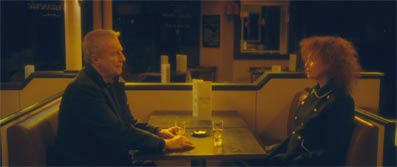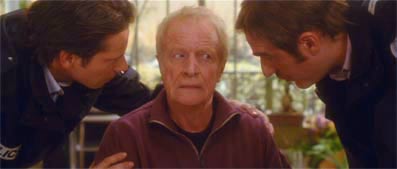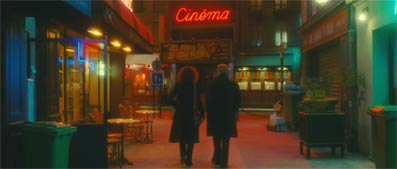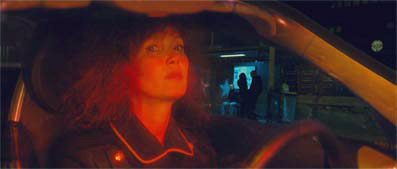|
At eighty-seven years young, veteran auteur, Alain Resnais' latest displays all the "everything and the kitchen sink" hallmarks of the first-time filmmaker, cramming in every idea and inspiration absorbed over time without thinking too deeply about it. Untethered from logic in a whimsical freefall that hits every branch of the genre tree on the way down, narrative cohesion is gunned down by youthful, anarchic exuberance as the camera cranes, roves and smash-zooms like Sami Rami running a Three Stooges marathon. Even more disconcerting is how intended moments of pensive vulnerability are fatally misjudged in a tonal spaghetti junction pile-up of incomprehension that belies the experience of a career dating all the way back to the beginning of the Nouvelle Vague. X-Files composer Mark Snow's score often serves to make already head-slapping, 'what the fuck' moments that much more pronounced: as an embarrassed Georges (André Dussollier) tries to hide the broken zip of his trousers from the woman with whom he's obsessed, the music clangs with the kind of ominous dread and threat normally reserved for a case for Mulder and Scully.
Resnais is so caught up in his own visual waltzing, he can't slow down to stop and think about what he's chucking up on screen. Seeming to want to prove himself to a younger generation of filmmakers (he borrows key cast members and cinematographer Eric Gautier from regarded director of the moment Arnaud Desplechin), Resnais' onus on the visually experimental discards his renowned penchant for intellectual reflexivity through literature, theatre and text and finds him floundering.

Based on the novel "L'incident" by Christian Gailly, Resnais uses the excuse of the incident at his film's center, to spin off into a confused commentary on unconscious desire. Marguerite (Sabine Azéma) has her purse snatched by a thief only to have her wallet recovered by married-but-lonely, sixtysomething Georges, passive aggressively seeking companionship as his reward. As Georges starts stalking Marguerite, through a series of increasingly foot-in-mouth letters and phone calls, hints of a thriller are planted but never satisfy because of Resnais' outright refusal to elaborate or develop them. Passing two young girls in a parking lot right before finding Marguerite's wallet, Georges flippantly remarks through interior monologue, how he wants to touch them and how touching makes him want to strangle them. This tantalizingly revelation is tossed out before being immediately reeled back in, Georges stopping the thought short: "You know what it cost you in the past"; an ellipsis that only begs more questions Renais is only too reluctant to answer. This is one of many bizarrely left-footed moments that set up a repressed sinister past shaking its chains loose à la Brain DePalma, but with no payoff whatsoever, it can only read as an element that's mistakenly wandered in from another film altogether, having no cause or effect on the central relationship, that against the odds sprouts like wild grass between Georges and Marguerite. All this earlier teasing of misdirection is nothing but detrimental to the central relationship, disrupting the viewer's attempt to connect in any meaningful way to the couple's tragic-comic and utterly unconvincing romance; you're either afraid for Marguerite, believing the psycho killer might rear his head at any minute, or feel only a mixture of pity and contempt for Georges, a sociopath hung up on unresolved, dead-end psycho-analytical tangents. No matter how many times the director clumsily resorts to a too-often repeated motif of grass thriving in the cracks of gutters and pavement where you least expect it, he's never once able to justify character responses so unpredictable, unexplainable and un-relatable to human behavior – even at its most irrational – and you have to wonder if the title isn't in fact a reference to whatever Renais was smoking at the time of shooting. Once you've witnessed the "I knew you'd want it" passionate kiss in front of André's house that leads to an off-screen tryst with a woman he'd barely been introduced to in a previous scene, and who up to this point was the sole voice of reason, rightly seeing André for the creep he is, you can no longer defend the film as a flight of fancy, after it's swan-dived off the plank into a sea of preposterousness.

Despite being unable to anchor his theme where it matters most, namely characters and their motivations, cause and effect is one of the central themes that Renais goes ahead and attempts to explore anyway with or without a compelling thesis. The structural defects are such that he spends too much time jumping erratically between different levels of various character's consciousnesses like a set of traffic lights on the fritz and straining to tie it altogether; painting over the lack of natural flow between scenes with an unhealthy dependence on fade-outs. In a final admittance of defeat he has to resort to the 'get out of jail free card' that fools no-one: the use of an omnipotent narrator to help him and his audience navigate a maze of cryptic twists and turns, none more infuriating than an ending which brazenly tackles the subject of re-incarnation in its closing seconds. The narration itself is nothing but a crutch, clearly aiming for the novelistic whimsy of The Royal Tenenbaums but quickly proving itself one irritating quirk too many.
Amidst all this mess and confusion there is a half-hearted effort to get us to think about how happenstance and fate affect the outcome of our desires; how desire itself is an invitation for the unexpected. Describing his film at Cannes in 2009 where he received a consolatory lifetime achievement award, Renais spoke of the "desire of desire". Desire, not love is what the film is concerned with, an emotion that contrary to the youthful Mise-en-scène, is intruded upon for the would-be lovers by the reality of old age. In much the same way, the emotional connection for an audience will prove elusive, certainly in large part due to the director breaking out in a new direction that sees him painting in colours instead of words. To paraphrase longtime collaborator and partner Sabine Azéma in the interview included on the disc, "a focus on hair, hands and feet instead of dialogue". With her frizzled shock of red hair, the clearest evocation of the film's title, Azéma is the manic pixie dream girl Zooey Deschanel could only dream of being at sixty, and the film is every bit as fixated on this coded artifice of personality, sweeping aside the importance of motivation for details: the fetishized minutia of hair, décor and set design. We see only Marguerite's hair for the first six and a half minutes before her face is finally revealed (mostly obscured by milky bathwater). In the same way that Scott Pilgrim is hooked by his love interest's colourful locks, Wild Grass plays as Scott Pilgrim Vs. the World for the middle aged, and despite their advanced years Georges/Renais' infatuation is just as juvenile. Edgar Wright's comic book tour de force used the prisms through which the characters see themselves as a shorthand for illuminating their psychology, so too here, though the prism this time is more specific; classic cinema rather than the all-enveloping saturation of pop culture. Renais again falls foul of repetition when using this device to make an argument without the establishing the facts. Repeated shots of Georges being pulled back by some invisible tractor beam through the doors of a movie theatre are supposed to show us visually, how cinema soothes and comforts, that his social deficiencies as an adult are forgotten about when he re-watches the films he first saw as a child in the fifties. This can't work because cinema as a means of escape for Georges is never established before the first occurrence of this gimmicky shot, taking on no further cumulative power through repetition because it never meant anything in the first place. Even his dialogue contradicts what Renais is attempting to express. After revisiting 1954's The Bridges at Toko-Ri, Georges has to admit, it did nothing for him. Usually I'm a sucker for whenever a director uses their film as an excuse to exhibit their own unabashed cinephilia, but here it only ever feels forced and does nothing to engender any good will towards the character. In the same way I was unconvinced by the romance between two nutjobs, I was just as skeptical about this first draft of a love letter to cinema.

It was in fact the billing of the crème de la crème of modern French cinema marquee names that rocketed this film up my highly anticipated list when I first read about the film after Cannes earlier this year. While Mathieu Amalric is able to settle on just the right frequency in what should have stayed on course as a comedy of manners of the commonplace and the ordinary, Emmanuelle Devos comes in far too late in the third act to properly register and Anne Consigny is utterly wasted, something I'll venture has been characteristic of many of her roles since her superlative turn in Not Here to Be Loved.
Borrowing from others, clearing clearly doesn't help Renais, who is distinctive enough on his own terms. If Desplechin's next generation players are an ill fit, the director's insistence on trying to replicate Christian Gailly's prose visually rather than filter it through his own meta sensibility is what has ultimately undone him here. Heralded as a stunning return to form by critics, recalling the director's glory days of Last Year at Marienbad, such comments smack of pandering to old age. Visually splendid yes, but as an exercise in style, Wild Grass is only ever perversely entertaining but not in the least edifying. I don't mind confounding absurdism, but I prefer whenever possible, to see detours of the surreal backed by rigorous or at least serious intellectualism. What we have here is something farcically treated, a world away from the politicalism of Last Year at Marienbad and all the worse for it.
Framed 2.40:1 and anamorphically enhanced, the picture has a slightly filtered look, whic is emphasised by a stylised colour palette that enhances or plays post-production games with the colour palette, particularly in scenes set in artificial light (a café bar, Marguerite's apartment or car). The contrast and detail are both good on daylight exteriors, though have less punch in darker scenes. No-one's going to mistake this for a Blu-ray, but a pleasant transfer nonetheless.

The lack of real surround work leaves the choice between the Dolby 2.0 stereo and Dolby surround 5.1 a matter of personal preference – dialogue is spread between the left and right front speakers on the former and confined to the centre on the latter. Voices and music are more effectively mixed on the 5.1, particularly the spoken thoughts that accompany Georges' POV shots.
Interview with Sabine Azéma (14:34)
In this interview for French Channel Cine Moi, (you francophiles with Sky TV, flick to channel 343), the leading lady talks up the film in segments intercut with the theatrical trailer. Unsurprisingly, as Renais' real-life partner, she is full of praise and spends her time toeing the party line, explaining the themes that weren't coherent enough in the finished product and which I have hopefully elucidated in the above review. She talks about how over the course of ten films together, this is her most visually emphasized character and as with all the projects before it, she is involved in every aspect, discussing everything from wardrobe to the pictures in her character's apartment. She stresses how she was trained by Renais initially way back when (and being that much younger and inexperienced at twenty-seven years his junior), not just in how to act for the camera but how to best collaborate on a project, undertaking a lot of research and 'shopping' for the role. For Wild Grass she went as far as to read all thirteen of novels to Renais out loud before the shoot, presumably to get the rhythm of the prose he was so fascinated with capturing visually. Azéma doesn't see any of this as a chore at all, likening it to the unpaid job you did as a child because you loved it.
Also included is the American release Trailer (2:01) with is peppered with gushing press clips, one of which calls it a "masterpiece."
At liberty but spinning his wheels, it's not a matter of 'dialing into' Renais' wavelength as many critics have suggested, rather it's that his articulation and tonality is wrong-footed from the start. If nothing else, Wild Grass proves there's still vibrant life in the eighty-seven-year-old auteur who clearly has a lot on his mind and just as much to say. Whatever more we're yet to see from him, I can only hope that next time he is able to cut through the static and come through loud and clear. Old age is the time to embrace being yourself and he'd do well to adopt the same attitude on his next feature.
|